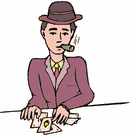How Does Card Counting Work?
 Counting Cards Explained
Counting Cards Explained
Until now, most of what I've written about blackjack strategy has been written for beginners. Today I want to get into some more advanced blackjack strategy, but this is still aimed at beginners. This post is about how card counting works.
The first thing you should understand about counting cards is that you don't have to be a genius in order to count cards. It doesn't require exceptional memorization skills at all, in fact. You do need to be able to concentrate in stressful situations though.
In a game of blackjack, a player wins more money when he's dealt a natural 21. Those bets pay out at 3 to 2 instead of even odds. Certain cards make getting a natural more likely, while all the other cards make getting a natural less likely. The only way for a player to get dealt a natural is to receive an ace and a ten, so those two cards are the most important cards in the deck.
Card counters track how many aces and tens have been dealt out of the deck already. The fewer aces and tens are left in the deck, the less likely it is that you'll be dealt a natural, so you should bet less in those situations.
On the other hand, lower value cards make it more likely that a player will be dealt a "stiff" hand. That's a hand that's likely to bust. Since the players bust before the dealer makes her playing decisions, having a higher likelihood of busting is bad for the player. In a deck with a lot of low-value cards, like twos, threes, fours, fives, and sixes, players should bet less.
 Playing Blackjack with Multiple Decks
Playing Blackjack with Multiple Decks